The Life of Dharma and the End of Life
Balance in New Puget Sound Zen Center Home
Written by: Cynthia Perkins
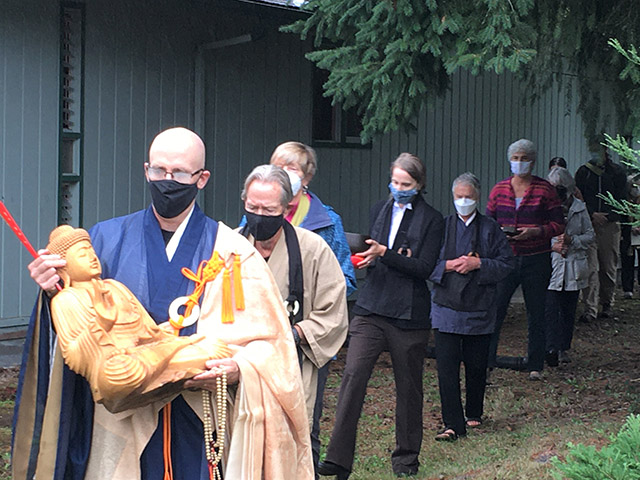
Abbot Koshin Chris Cain leads the Puget Sound Center Sangha into their new meditation hall during the October blessing ceremony.
Photos by: Lidunn Cain, Josh Lawler
Puget Sound Zen Center members are settling into a new meditation hall, which in a unique reflection of the Buddha’s teachings, will also continue serving as the chapel for a funeral home.
The Vashon Island sangha joyfully celebrated the purchase with a formal blessing ceremony on October 3. Vashon is a residential island west of Seattle.
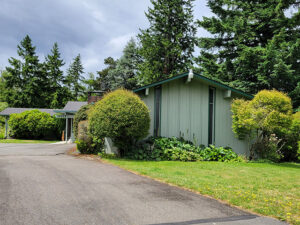
The new Zendo and property on Vashon Island, purchased by Puget Sound Zen Center in September, 2021.
The ongoing reminder of the nearness of death seems a natural fit to sangha members. Puget Sound Zen Center Abbot Koshin Chris Cain said, “Life and death are great matters. We’re okay with that.”
The Zen center’s new meditation hall, which seats 100, has served as Vashon’s only funeral home chapel since Island Funeral Service had it built in 1966.
A unique part of the purchase agreement is a seven-year lease back to Island Funeral Service, allowing the funeral director to rent office space in the building, and when needed to convert the meditation hall back to a chapel for memorial gatherings.
The September purchase marked the end of an 18-year search by the sangha to find a permanent home. Over these years the Zen center had rented three facilities in succession, and had even purchased a tract of raw land that turned out to be unsuitable.
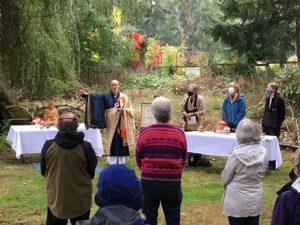
Cain speaks to sangha members, at the blessing ceremony that consecrated their new home.
The unanimous July vote by the membership, to make an offer on the existing funeral home building and land near the center of Vashon’s village, reflected the group’s perseverance. Through changing conditions members have focused on a long-term goal of creating their own space in the Puget Sound area, dedicated to meditation, study and retreats in the Rinzai Zen tradition.
Three years prior, the Zen Center had purchased almost seven acres of undeveloped land. The plan was to begin construction of a meditation hall and supporting structures in 2025. However, obstacles turned out to be more numerous and difficult than the group had anticipated.
“Some challenges arose with King County zoning and regulations, as the property was not zoned for commercial use,” said Zen Center Board President Diane Sweetman. “Our research made it clear that working through the permitting and fundraising to build a brand-new building was going to be a daunting process.”
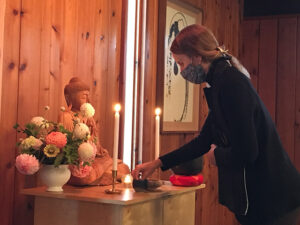
Myoshin Elizabeth Fritterer lights candles at the meditation hall altar, during the blessing ceremony.
Thus the funeral home opportunity was welcomed by members as positive for all involved.
Historically, (and continuing through today) most funerals in Japan are officiated by Zen monks. Zen Center members embraced the history of this site, which for over 50 years has been where Vashon residents conducted the deepest ceremonial rituals honoring the impermanence of life.
As Sweetman observed, “This property is a sacred space.”
The sangha plans to create a series of beautiful Zen gardens on the 2.5-acre site, to share with the Vashon community. The gardens will be open for viewing by the public, and also will be used for walking meditation at Zen center services and retreats.
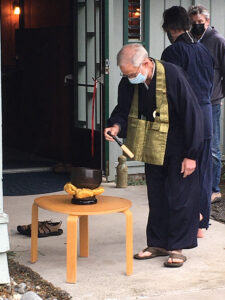
Sangha member Wes Borden strikes a keisu (gong used during chanting) 108 times, at the meditation hall entrance, as part of the blessing ceremony.
Another feature of the new facility will be a lending library, for Buddhist students, of the Zen center’s collection of 700 books. The collection includes Zen titles, plus books from different schools within Buddhist tradition and other spiritual faiths, as well as books on psychology, end-of-life issues, literature, the arts, and even for children.
When Cain founded Puget Sound Zen Center on Vashon in 2003, the program consisted of one weekly service, conducted in a small loft above an orthodontist’s office in a grocery-store parking lot.
As interest grew the Zen group moved to an artist studio in a residential neighborhood. With further growth the group then moved to a building shared with the Jewish community of Vashon.
Now, 18 years later, that one service weekly has expanded into daily morning and evening services. Two residential retreats are offered each year, along with seasonal daylongs and monthly half-day sits.
Zen Center activities also include a yearly dharma study series and weekly Qigong classes. The sangha also supports ongoing discussion groups focused on racial justice, and end-of-life issues.
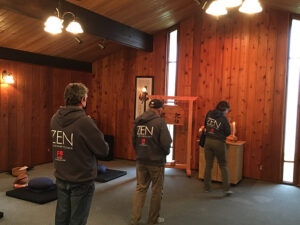
Three sangha members offer tribute before the meditation hall altar.
The sangha currently grows a vegetable garden to contribute to the Vashon Food Bank. Other service projects have included preparing monthly community dinners for the homeless, and picking up litter from the roadways. All this activity is supported by six standing committees, with more than 40 volunteers contributing time and energy.
In 2019 a branch of The Puget Sound Zen Center was launched in West Seattle. However, that was halted the next March due to the Covid-19 pandemic, when all in-person services were suspended and were moved online to Zoom.
Far from diminishing Puget Sound Zen Center, moving online caused membership to grow and spread geographically. The group now has more than 80 members, with local members augmented by others along the West Coast from British Columbia to California, and as far away as Norway. Cain also serves as the formal teacher of the Rinzai Zen Center in Oslo.
During the last few years members have increased in numbers and commitment. Four sangha members will be ordained as lay monks, to continue their training and to assist the abbot with his duties.
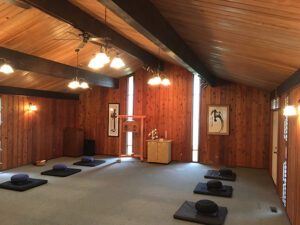
The former funeral home chapel has been converted to the new Puget Sound Zen Center meditation hall.
Further assistance comes from Puget Sound Zen Center Adjunct Teacher Genko Kathy Blackman. While ordained in the Rinzai tradition, Blackman has also studied in the Vipassana and Tibetan lineages, and has been a serious student of Japanese tea ceremony.
Although the Zen Center has regularly welcomed guest speakers and dharma teachers from many spiritual traditions, the move to Zoom has allowed guests to teach from well beyond the Puget Sound area. Bringing teachers by Zoom will continue even after in-person meetings resume.
Many of the teachers come to Puget Sound Zen Center because of the long relationships cultivated with Cain, when he was at Mt. Baldy Zen Center in California. Cain practiced as a monk at Mt. Baldy from 1991 through 1999, then was ordained as a teacher by Joshu Roshi, a Japanese-born Zen master. For three years Cain served as vice-abbot of Mt. Baldy Zen Center.

The lounge area off the building’s kitchen offers a place for members to socialize.
In 2003 Cain, his wife Soshin Lidunn, and their young son moved to Vashon Island to establish Puget Sound Zen Center. On Vashon he and Lidunn started a dharma supply business called Still Sitting, which continues online selling meditation supplies, Buddhist clothing, jewelry and iconography.
In 2013 Joshu Roshi’s years of sexual improprieties with female students became widely publicized in both Buddhist and mainstream publications. Cain wrote of his angst about Joshu Roshi’s actions in a Zen Center newsletter that year.
“The truth is, I have great respect for Roshi’s teaching and the training he set up,” Cain wrote. “I have a great deal of anger and bewilderment about the Roshi’s lack of regard for women.”
The crisis ultimately drove the Puget Sound Zen Center sangha to end its affiliation with Rinzai-ji, Inc..
It has been a long journey for the Puget Sound Zen Center, and a new stage of that journey is beginning. It is Cain’s intention that the Zen Center’s new home will be a place of deep spiritual connection and quiet contemplation for islanders and visitors for decades to come. Cain said,
“I hope this place is a beautiful, thriving center, when I retire and when I die.”
Cynthia Perkins has been a student of Buddhism since 1998. Though long schooled in the Vipassana tradition, she joined the Puget Sound Zen Center because having an active, in-person sangha in her own community became more important than the particular form of Buddhism being practiced.
